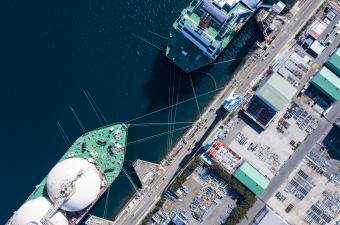
OVERVIEW
Alpha Marine Corp v Minmetals Logistics Zhejiang Co. Ltd (The M/V Smart) [2021] EWHC 1157 (Comm)
In a judgment handed down on 5 May 2021, Mr Justice Butcher held that a bill of lading carrier has an unfettered right to collect freight under the bill of lading even where the vessel has been time chartered and freight is to be payable “as per charterparty” i.e. to someone other than the carrier. In so doing he decided a point left open by the Court of Appeal in The Bulk Chile [2013] 2 Lloyd’s Rep 38.
Facts
The MV Smart (“the vessel”) was chartered by Alpha Marine Corp (“Owners”) to Minmetals Logistics Zhejiang Co Ltd (“Charterers”) on a time charter trip on an amended NYPE form (“the Charterparty”) from Richards Bay, South Africa. Charterers sub-chartered the vessel on a voyage charter to General Nice Resources (Hong Kong) Ltd (“GNR”). GNR was also the lawful holder of the Bills of Lading.
Shortly after departing from Richards Bay the vessel ran aground just outside the channel and later broke her back.
Charterers issued a freight invoice to GNR under the voyage charter because freight was deemed to be earned “whatever vsl/cargo lost or not” and was to be paid on or before 45 days from the date of sailing from the load port.
Prior to the date for payment, Owners notified GNR that they had revoked Charterers’ authority to collect freight under the Bills of Lading and directed that freight should be paid to them and not Charterers (“the Notice”). Charterers objected to that course of action and as a result freight was not paid to Owners or, indeed, Charterers.
Nearly two years later a small proportion of freight was paid by GNR into escrow pursuant to a tripartite agreement but prior to all the freight being paid, GNR was wound up.
The Arbitration
Owners brought a claim in arbitration contending that the vessel had been lost by reason of a breach of the safe port warranty in the Charterparty claiming sums in excess of US$100 million. They also claimed a sum of c. US$450,000 in respect of bunkers consumed prior to the loss of the vessel which claim was advanced in the alternative on the basis that its primary claim failed.
Charterers contended that the Notice was in a breach of an implied term of the Charterparty that freight would not be collected by Owners under the Bills of Lading unless sums were due under the Charterparty and claimed (i) damages in the amount of the freight that should have been paid by GNR but was not, (ii) payment of the freight in escrow, and (iii) damages in respect of costs and expenses incurred in dealing with the freight dispute.
The Tribunal accepted that there was an implied term. They did so by reference to a passage in Time Charters which, relying on a dictum from Tomlinson LJ in The Bulk Chile [2013] 2 Lloyd’s Rep 38. stated that, “ordinarily under the terms of the New York Produce and similar forms of charter, there is an implied obligation on the owners to allow the charterers to collect the freight. That obligation is an implicit corollary of the obligation in clause 8 to allow the charterers to direct the ship’s employment”.
Tomlinson LJ had said this in The Bulk Chile:
“However it is to my mind arguable that a time charterer who is not in default of his obligation to pay hire, and other amounts, under the head charter could restrain a shipowner from demanding payment of bill of lading freight to be made directly to himself, on the simple ground that until such time as the charterer is in default the shipowner has, by reason of clause 8 of the NYPE form, or a similar employment clause, agreed to delegate collection of freight to the charterer … I am far from convinced that a charterer would be without a remedy in the event that a shipowner took the unusual course of intervening in an attempt to collect freight in circumstances where the charterer was duly performing his obligations under the head charterparty”.
The Tribunal also held that the implied term was breached. It was not explicit from the Award what the content of the term said to be implied was and why it was said to be breached given that the Tribunal did award the Owners their bunkers claim.
The Appeal
Owners obtained permission to appeal from Mr Justice Foxton under s. 69 of the Arbitration Act 1996 on the following question of law:
“Did the Charterparty contain an implied obligation that the Claimant would not revoke the Defendant’s authority to collect from GNR the freight payable under the Bills of Lading unless hire and/or sums were due to the Claimant under the Charterparty?”
By reference to authorities such as Molthes v Ellerman’s Wilson Line Ltd [1927] 1 KB 710, Wehner v Dene Steamship Co [1905] 2 KB 92 and indeed The Bulk Chile itself, Owners argued that it was well established that
- Under the Bill of Lading contract, Owners had an unfettered right to collect freight from the Bill of Lading holder whether or not sums were due under the head time charter party.
- Upon collecting the freight, Owners had an obligation to account for any surplus i.e. the amount of the freight collected less the sums owing (if any) under the head time charter.
Against that background Owners argued that an implied term did not meet the tests of obviousness and necessity as re-stated by the Supreme Court in Marks and Spencer v BNP Paribas Securities Services Trust Company (Jersey) Ltd [2016] AC 742 because the mischief against which the implied term was directed, namely non-payment to Charterers, was addressed by the obligation to account.
Owners further argued that there were difficulties in identifying the precise term to be implied (as reflected by the fact that there were three alternative terms before the Court) which, on the authorities, militated against the implication of any term and that there were a number of practical problems with each of the proposed implied terms.
Owners accordingly contended that a shipowner had an unfettered right under a time charter to collect the Bill of Lading freight.
In the alternative, Owners argued that the only implied term that could conceivably be justified was the so-termed “All Freight Implied Term” i.e. that Owners were entitled to collect the entirety of the freight even if it exceeded the amount of Owners’ claim arising out Charterers’ default. If that term fell to be implied, there had been no breach because Charterers had been in default at the time of the Notice, namely in failing to pay the sum due in respect of bunkers.
Charterers submitted that either the All Freight Implied Term should be implied or the “All Freight (Sum Identified) Implied Term”, i.e. the right to collect freight arose only where a sum was due to Owners under the Charterparty and the relevant sum was identified at the time Charterers’ authority was revoked, or the “Dollar for Dollar Implied Term” i.e. the right to collect freight arose only where a sum was due to Owners under the Charterparty equal to or greater than the freight.
Charterers further submitted that if the All Freight Implied Term fell to be implied then the Tribunal had found in its Award that no sum was due under the Charterparty and that was a finding of fact which could not be disputed on a s. 69 challenge.
Mr Justice Butcher accepted that the test for implication was not met and that none of the proposed terms were obvious or necessary in that the Charterparty did not lack commercial or practical coherence without an implied term restricting Owners’ right to intervene to collect freight. In that respect, he relied heavily on the existence of the obligation to account. Whilst he recognised that the precise basis for that obligation had not yet been subject to detailed consideration by the Courts, he observed that the existence of the obligation was not in doubt and, as Tomlinson LJ had said in The Bulk Chile, it had not given rise to real problems in practice.
He further rejected the argument that an unfettered right of a shipowner to collect freight interfered with a charterer’s employment of the vessel or deprived it of the benefit of the vessel’s earning capacity. Moreover, on the facts of this particular case, he stated that it was difficult to see how there could be any interference with the Charterers’ rights to employ the vessel where at the time of the Notice, the vessel had suffered a casualty which had brought the charter to an end.
He also accepted that there were a number of practical problems with each of the proposed terms.
Finally, the Judge also accepted that if the All Freight Term fell to be implied (contrary to his analysis) it had not been breached in any event.
Implications
The judgment in this case has broad application given that the terms of the Charterparty and the Bills of Lading under consideration were in standard form. Whilst it may be a rare case that a shipowner is moved to collect freight under a Bill of Lading where there is no default under the head time charter, the judgment provides welcome clarity such that disputes of the kind experienced in this case between owners, charterers and shippers about who is entitled to collect the freight should be eradicated. Moreover, there may well be cases where the unfettered right to collect freight really is of value to a shipowner, such as where it is anticipated that a future default by the charterer may occur and the due date for the payment of freight is imminent. In such a situation, it is doubtful that the shipowner would be entitled to collect freight under the All Freight Implied Term (had such term being implied) and it is certain that it would not able to do so under the right of lien on sub-freights in clause 18 of the NYPE form.
It remains to be seen whether charterers will seek to circumscribe the right of owners to collect freight by express terms of the head time charter and, if so, whether owners will be willing to agree to such terms.
Paul Toms was Junior Counsel for the successful Owners instructed by Mills & Co Solicitors.

